Family of murdered Mahsa Amini boycotts elections
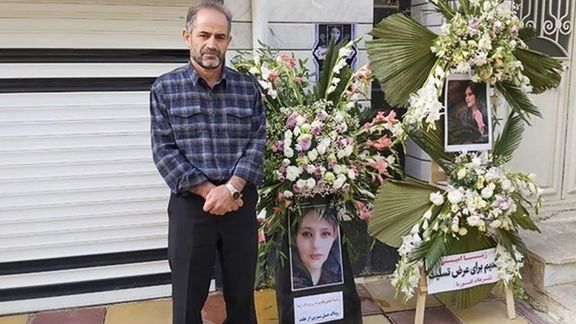
The father of Mahsa Amini, whose death in Iran's morality police custody sparked a nationwide uprising, stated his family is boycotting the sham presidential elections.

The father of Mahsa Amini, whose death in Iran's morality police custody sparked a nationwide uprising, stated his family is boycotting the sham presidential elections.
“We are not endorsing any specific candidate in this election, and we have little hope for the realization of justice in the future," Amjad Amini wrote on Instagram.
Since Mahsa’s death in September 2022, her family has been under considerable pressure from the government, including being faced with travel bans. Her father has faced multiple summons to the Intelligence Office in Saqqez since her death.
Mahsa’s uncle has also been detained by security forces, and threats have been levied against Mahsa's brother.
In December, the family's lawyer, Saleh Nikbakht, was sentenced to prison, charged with "engaging in propaganda against the Iranian regime."
The national and global outrage over Mahsa's death is one of the most significant challenges to Iran's clerical establishment since the Islamic Republic was established in 1979.
In March, a UN fact-finding mission declared that Tehran's crackdown on the 2022 protests—including killings, imprisonment, torture, and sexual violence—constitutes crimes against humanity.
The Fact-Finding Mission was established by the UN Human Rights Council in November 2022, two months after the Woman, Life, Freedom protests erupted across the country in response to the death of 22-year-old Iranian-Kurd, Mahsa.
The team concluded that Iran is responsible for "physical violence" leading to Amini's death. The Iranian authorities have denied responsibility, attributing her death to a childhood medical condition following surgery.
However, the UN report dismissed this explanation, confirming "evidence of trauma to Ms Amini's body, inflicted while in the custody of the morality police."
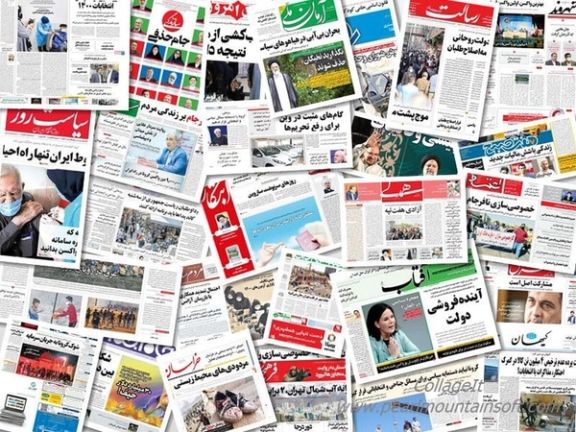
As Iran’s presidential election runoffs approached this week, the government intensified its media crackdown to control the narrative amid historically low voter turnout in the first round on June 28.
Tehran Prosecutor's Office issued a "warning" to the management of the Tehran-based economic newspaper Jahane Sanat over "publishing an article about the election results," according to a report by Iran’s judiciary news agency, Mizan, on Tuesday.
"The judicial case of this newspaper will be investigated in this regard," added Mizan.
In April, a case was opened against Jahane Sanat for “compromising national security" for coverage of Iran’s April 13 missiles and drone attack against Israel.
Earlier in June, Iran's Press Supervision Board issued strict guidelines for media coverage of the upcoming election emphasizing that disseminating material that promotes "the boycott of elections and lower participation" and "organizing unauthorized protests, strikes, or sit-ins" constitutes a crime. These guidelines also prohibit media from publishing the results of opinion polls.
According to non-profit rights group Defense of the Free Flow of Information (DeFFI), 17 newspapers in total have received warnings. DeFFI noted that the judiciary is attempting to mitigate the negative public perception associated with terms like "declaring a crime" and "filing a judicial case." To this end, the judiciary is increasingly using less charged terms like "warning" without actually altering the level of repression or the underlying legal processes. This approach follows extensive extralegal actions against media and journalists, aiming to soften the language while maintaining strict control over the press.
Additionally, the Iranian Ministry of Interior denied press credentials to four journalists from Shargh Newspaper hours after voting began in the presidential election, effectively barring them from covering the process. Officials abruptly canceled credentials for ‘reformist’ newspapers Shargh and Hammihan reporters, according to IranWire.
Last week, Iran’s security and intelligence forces sealed the studio of the liberal-leaning Fardaye Eghtesad (Economy's Future) media outlet.
DeFFI further noted that in June 2024, security and judicial incidents against Iranian media increased ninefold to 27 in comparison to the previous month. This marked the highest level of media suppression in a single month since the beginning of 2024.
The Islamic Republic has restricted press freedom since the early 1980s. Hundreds of journalists have been arrested over the years and some have spent long years in detention.
Meanwhile, most government-controlled media associated with the regime's 'reformist' and hardliner factions continued urging people to vote in the second round on Friday. They all prominently highlighted Supreme Leader Ali Khamenei's call on Wednesday to make up for the low turnout last week.
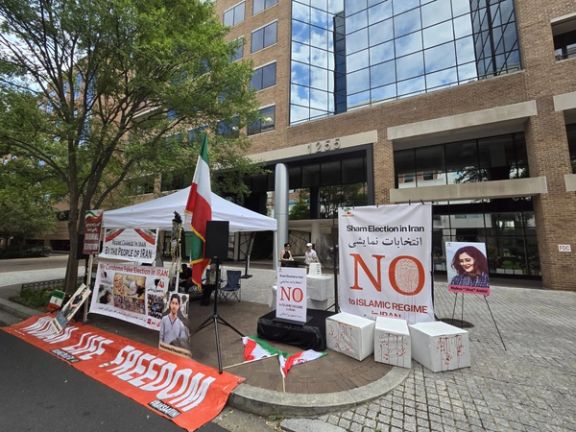
In the midst of the second round of presidential elections in Iran, which saw a historic low turnout by the majority of voters, the issue of ballot boxes in Western countries sparked widespread protests among the Iranian diaspora.
These protests were particularly significant in the United States, home to the largest Iranian community outside of Iran.
The Biden administration has inexplicably allowed Tehran to establish over 30 polling stations across the United States, and it seems that the polls will continue for the second round. This decision is fundamentally flawed, as it legitimizes an undemocratic process, ignores robust opposition from Iranian democracy activists, and disregards US values and security interests.
Iranian elections are notoriously undemocratic. The US State Department has openly admitted that it does not expect the upcoming election to be "free or fair." In Iran, the electoral process is tightly controlled by the Guardian Council, which vets candidates to ensure they align with Supreme Leader Ayatollah Ali Khamenei's ideology. This leaves no real choice for the Iranian people, as only those loyal to the core of the regime are allowed to run. Even within Iran, there is significant apathy and distrust towards the electoral process.
From the outset, even government surveys revealed that over 73% of Iranians did not watch the first presidential debate, highlighting the populace's distrust and disengagement. This was later corroborated by the results of the first round, where the government announced a 39.92 percent turnout, prompting both candidates, Masoud Pezeshkian and Saeed Jalili, who advanced to the second round, to admit during their first one-on-one debate.
Khamenei views high voter turnout as a source of legitimacy for his regime. He has stated that every vote "increases the credibility and immunity" of the Islamic Republic. However, this so-called legitimacy is built on a foundation of repression and violence and denying the Iranian people the right to elect their leaders freely. Over the past six years, nearly 3,000 protesters have been killed, and tens of thousands have been arrested. The regime employs brutal tactics, such as blinding protesters with shotgun birdshots and carrying out chemical attacks on girls' schools, to maintain control.
Many Iranian Americans maintain that the US should stand with the Iranian people, who have repeatedly expressed their desire for change through protests and boycotts of sham elections. Many groups in Iran, including the Mourning Mothers, political activists, student and civil society organizations, and political prisoners, have called for a boycott of these elections, risking their safety to do so. By allowing these polling stations, the U.S. is inadvertently legitimizing a fraudulent system and ignoring the struggles of the Iranian people.
The Islamic Republic uses the participation of expatriates to whitewash its crimes and justify its rule. Former Foreign Minister Javad Zarif has pointed to voter turnout, including from those abroad, as evidence of the regime's legitimacy. This is deceptive, as the regime is desperate for legitimacy. According to their own statistics, the majority of Iranians abstained in the last four elections since 2020. Furthermore, the regime's international image has suffered significantly due to its involvement in the Russia-Ukraine war, the nuclear program crisis, and repression at home.
Canada has set a precedent by refusing to allow the Iranian government to set up polling stations on its soil for the past three elections. Despite not having formal diplomatic relations or an embassy, Canada has taken a principled stand in support of its Iranian-Canadian population and against the regime's propaganda. The US should follow Canada’s example and deny the Islamic Republic this platform.
Tehran has a history of using its embassies and consulates as bases for soft power expansion, propaganda dissemination, and monitoring of dissidents. Recently, a staff member at the Iranian Interests Section in Washington, DC, threatened an Iranian dissident with death, illustrating the regime's dangerous activities on US soil. Allowing polling stations could provide cover for further such activities.
The decision to allow polling stations in the United States is misguided and dangerous. The Biden administration responded to criticism by stating that both the Trump and Biden administrations granted permissions in recent elections, implying that this is not a new practice. However, past practices do not justify continued wrongs, especially given the changing realities in Iran. The uprisings of 2017, November 2019, and the 2021 "Women, Life, Freedom" movement, where people chanted "Reformist, principlist, the game is over," calling for the regime's overthrow, illustrate a clear shift in the Iranian people's stance.
Allowing these polling stations lends undue legitimacy to a repressive regime and poses security risks. The US must reconsider this decision and take a firm stand against Tehran’s efforts to exploit American soil for its propaganda and control. By doing so, the US would not only uphold its democratic values but also support the Iranian people's quest for freedom and justice.
The opinions expressed by the author are not necessarily the views of Iran International
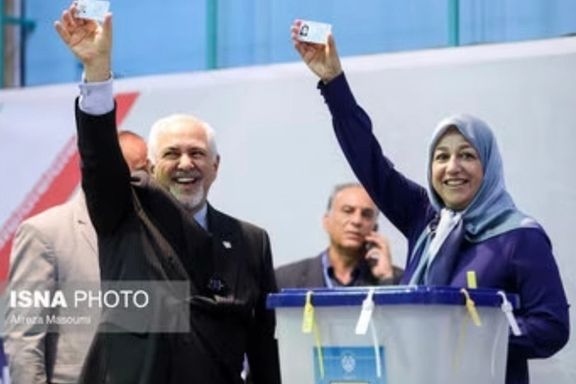
As the runoff race of the presidential election in Iran approaches, the government and its media are trying to create the illusion of a contested political atmosphere, to attract disillusioned voters.
With over 60% of the electorate abstaining in the first round on June 28th, the Islamic Republic faces a crisis of legitimacy. The boycott and abstention by a sizeable majority has highlighted public disillusionment with both 'revolutionary' and 'reformist' factions, which many Iranians view as two sides of the same coin. The two handpicked candidates have engaged in a series of provocative statements and what many observers call "theatrical infighting" to reignite public interest.
Supreme Leader Ali Khamenei, in his speech on Wednesday, tried to downplay the significance of the low turnout. He suggested that the lack of participation was not an indication of opposition to the Islamic Republic, but rather a sign that people were preoccupied with their personal lives. Yet, this attempt to save face seems to have done little to mask the regime's growing insecurity. Khamenei's directives to both political factions—who, as critics point out, cannot make a move without his approval—are clear: they must rally the disillusioned masses back to the ballot box to restore the government's “dignity."
Adding to the electoral maneuvering, Ali Akbar Salehi, former Foreign Minister and ex-head of the Atomic Energy Organization, entered the fray with comments about Saeed Jalili, the hardline presidential candidate. Responding to allegations that Jalili obstructed the revival of the JCPOA (Joint Comprehensive Plan of Action) during President Ebrahim Raisi's administration, Salehi revealed that “the agreement was nearly finalized and that former Foreign Minister Hossein Amir-Abdollahian was poised to sign it.”
The revelation was an implicit nudge to the electorate: a vote for Masoud Pezeshkian might revive the nuclear deal, although the real obstacle, as everyone knows, is Khamenei himself.
Salehi didn't stop there. He disclosed that the Supreme National Security Council had proposed an additional demand in the last moment that derailed the agreement. Jalili, as leader’s man in the council, he claimed, misrepresented Khamenei’s stance on secret negotiations with the United States. The narrative paints Jalili not just as an obstructionist but as someone who viewed possible diplomatic successes by others as personal competition rather than national imperatives.
The tensions within the government's ranks were further highlighted by Mohammad Javad Zarif, the former foreign minister who has been campaigning for Pezeshkian.
In an Instagram live session, Zarif criticized Jalili, questioning the origins of his "falsehoods" and suggesting they might “come from Israel.” Zarif, who was once criticized for glossing over government policies during Hassan Rouhani’s presidency, is now trying to get more people to vote, accusing Jalili of dishonesty and being responsible for brining on sanctions.
Zarif's plea to the public to reject Jalili on Friday might seem like a genuine call to action. However, many remain skeptical, seeing Zarif's efforts as yet another maneuver orchestrated to lure voters back to the polls. The fear voiced on social media is that, regardless of the election's outcome, the cycle of betrayal will continue—citizens' demands and freedoms will be forgotten, much like during the terms of presidents Rouhani and Mohammad Khatami.
As the second round of voting looms, the government's attempts to stage-manage the election underscore its vulnerability. The Iranian public, increasingly aware of the manipulations, faces a stark choice: participate in what many see as a sham process or continue to express their discontent through abstention. One thing is clear—the facade of electoral democracy in Iran is wearing thin, exposing the government's struggle to maintain its grip on power.
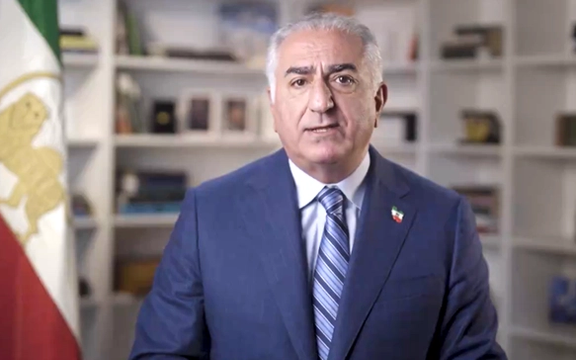
Iran's exiled prince, Reza Pahlavi, has called on Iranians to stay away from ballot boxes Friday, when Iran's next president will be determined in the runoff between Saeed Jalili and Masoud Pezeshkian.
"Put aside the false hopes and fears and join the decisive majority who consciously and courageously said no to the Islamic Republic," Pahlavi said in a video message Wednesday. "Don't let them kill our children in your name and on the back of your vote."
Official figures released by Iran's Interior Ministry put the turnout in the first round held on July 28 at 39.92 percent, the lowest recorded since the establishment of the Islamic Republic in 1979.
Reza Pahlavi on Wednesday quoted a tweet by Iran's Supreme Leader Ali Khamenei about the people's low turnout in the Friday's vote, and said, "Last week the Iranian nation humiliated your illegitimate regime. This week Iranians will again say no to your Election Circus as they seek to reclaim the freedom, dignity & prosperity you have stolen."
"Iran will succeed and relegate your dictatorship to the ash heap of history," he added.
Pahlavi's call for election boycott echoes that of many other Iranian activists who have boycotted Iran's presidential elections, making the turnout the central theme of this campaign.
Another prominent exiled opposition figure, Hamed Esmaeilion, had earlier published a post on X, praising those who did not vote in the first round last week, and inviting them to stay the course.
"We will not return from our path," he wrote. "Iran deserves democracy, and democracy is not achieved by manufactured votes, but by moving on from the Islamic Republic."
On Wednesday, Iran's Sureme Leader admitted that the voter turnout last Friday was "less than expected", but dismissed the idea that those who stayed away from the polls are against the "system."
"Some people may dislike certain officials or even the Islamic system," Khamenei said in a meeting with officials, "but the idea that everyone who did not vote is aligned with these individuals and this mindset is completely wrong."
Since last Friday, the two contenders in the runoff have tried to engage ordinary Iranians in the hope that a portion of the abstaining 60 percent would turn up this week and vote for them.
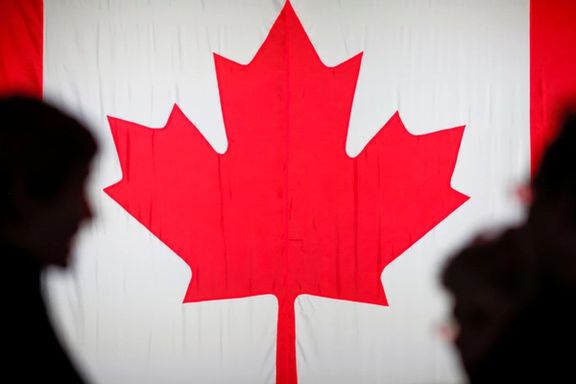
Canadian immigration authorities have initiated deportation proceedings against five suspected senior Iranian government officials residing in Canada.
The Canada Border Services Agency (CBSA) has alleged that these individuals held senior positions in Iran’s government and has requested the Immigration and Refugee Board (IRB) to conduct hearings on these cases, as reported by Global News.
This move is seen as the Canadian government's response to ongoing appeals from the Iranian diaspora to bar regime-affiliated officials from entering the country, particularly in light of the Iranian authorities' brutal crackdown on the nationwide Woman, Life, Freedom protests in 2022.
While the Trudeau government adopted sanctions in November 2022, barring individuals linked to the Iranian state from entering Canada, the first deportation order was initiated in February 2024.
The unprecedented protests in Iran were sparked by the death of Mahsa Jina Amini while in custody of the so-called morality police. Iranian security forces crackdown, resulting in the deaths of at least 550 protesters, was condemned as a crime against humanity by a UN fact-finding mission.
The policy previously resulted in deportation orders for Majid Iranmanesh, a science advisor, and Seyed Salman Samani, a former deputy interior minister, according to Global News.
In a departure from previous cases, the hearings for the five latest deportation proceedings are being conducted behind closed doors, with the government withholding their names.
The deportation hearings are typically public unless the individual has filed a refugee claim, as reported by Global News, citing CBSA.
In March 2024, CBC Radio exclusively reported that the Aban Families For Justice, representing victims of the 2019 Iranian protests, were appealing to Canada's Justice Minister Arif Virani to halt the deportation of Salman Samani.
They allege that Samani, a former Iranian deputy interior minister, was complicit in the brutal crackdown that led to the deaths of 1,500 protesters in 2019.
One of the group's founders, Soran Mansournia, told CBC Radio that he hopes Canada would hold Samani accountable for human rights abuses, using "universal jurisdiction."
Despite their letter, Samani's deportation has reportedly not been halted and the group did not receive a response from the Canadian government.
In 2012, Canada severed diplomatic ties with Iran and closed its embassy in Tehran, citing multiple concerns. These included Iran's support for the Assad regime during the Syrian civil war, non-compliance with UN resolutions on its nuclear activities, persistent threats against Israel, and the safety of Canadian diplomats following attacks on the British embassy in Iran.
Further straining bilateral relations, Canada recently escalated its stance by designating Iran's Revolutionary Guards Corps (IRGC) as a terrorist organization. This decision, announced on June 19, was strongly supported by the families of the victims of Ukraine International Airlines Flight PS752, which the IRGC downed in January 2020.
The designation of the IRGC as a terrorist entity, as articulated by a Public Safety spokesperson to Iran International’s Negar Mojtahedi, targets individuals who have actively engaged in or significantly contributed to terrorism and acts of violence. This classification enables Immigration, Refugees and Citizenship Canada (IRCC) to deny visas, entry, or continued residence to these individuals in Canada.